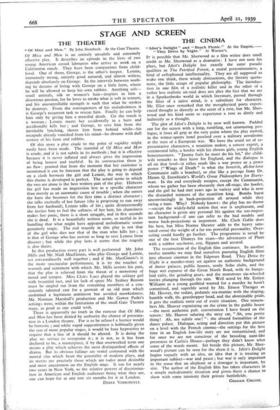STAGE AND SCREEN
THE THEATRE
"Of mice and Men." By John Steinbeck. At the Gate Theatre.
Of Mice and Men is an entirely unsubtle and extremely effective play. It describes an episode in the lives of two
young American casual labourers who arrive to work on a Californian ranch. They have been companions from child- hood. One of them, George, is the other's keeper. Lennie, immensely strong, entirely good natured, and almost witless, depends absolutely on George. In the intervals between work- ing he dreams of living with George on a little farm, where
he will be allowed to keep his own rabbits. Anything soft—
small animals, silk or women's hair—inspires in him a disastrous passion, for he loves to stroke what is soft in texture, and his uncontrollable strength is such that what he strokes he destroys. From the consequences of his maladroitness it is George's recurrent task to rescue him. Finally he can help him only by giving him a merciful death. On the ranch is a woman ; Lennie meets her accidentally in a barn and accidentally kills her ; and George, to save him from the inevitable lynching, shoots him from behind while—his escapade already vanished from his mind—he dreams with dull ecstasy of his farm and rabbits.
Of this story a play crude to the point of vapidity might easily have been made. The material of Of Mice and Men is crude, and it is not subtle in its methods ; but it is effective because it is never inflated and always gives the impression of being honest and truthful. In its construction there is no flaw : granted that from the moment that her existence is mentioned it can be foreseen that the play is going to depend on a clash between the girl and Lennie, the way in which this theme is developed is perfect. The actual scene in which the two are alone is the best written part of the play. Hitherto the girl has made an impression less as a specific character than merely as an automatic cause of trouble ; when she enters the barn she becomes for the first time a distinct character ; she talks excitedly of her future (she is proposing to run away from her husband), Lennie talks of his ; quite disinterestedly she invites him to feel the softness of her hair, his clumsiness makes her panic, there is a short struggle, and in five seconds she is dead. It is a beautifully written scene, so tactful in its handling that what might have appeared melodramatic seems genuinely tragic. The real tragedy in this play is not that of the girl who dies nor that of the man who kills her ; it is that of George who has striven so long to save Lennie from disaster ; but while the play lasts it seems that the tragedy is also theirs.
In this production every part is well performed Mr. John Mills and Mr. Niall MacGinnis, who play George and Lennie, act extraordinarily well together ; and if Mr. MacGinnis's is the more spectacular performance, it is by the touches of warmth and sentiment with which Mr. Mills invests his part, that the play is relieved from the threat of a monotony of mood and temper. Miss Claire Luce played the solitary girl with beautiful tact, and for lack of space Mr. Sydney Benson must be singled out from the remaining members of a con- sistently talented cast for a portrait of an old man which enshrined a legitimate sentiment but avoided mawkishness. Mr. Norman Marshall's production and Mr. Gower Parks's settings were, within the limitations of the small Gate Theatre stage, as good as one could wish.
There is apparently no truth in the rumour that Of Mice and Men has been denied by authority the chance of presenta- tion in a London theatre. For it to be refused a licence would be fantastic ; and while vapid suggestiveness is habitually given the run of more popular stages, it would be bare hyprocrisy to require that a line of it should be altered. It is doing the play no service to overpraise it ; it is not, as it has been declared to be, a masterpiece, if by that overworked term one means a play which achieves the most distinguished effects of drama. But its obvious failings are venial compared with the mortal sins which beset the generality of modern plays, and its merits are precisely those which are today most desirable and most uncommon on the English stage. It ran for nearly two years in New York, so the relative powers of discrimina- tion in American and English audiences being what they are, one can hope for at any rate six months for it in London.
DEREK VERSCHOYLE.










































 Previous page
Previous page